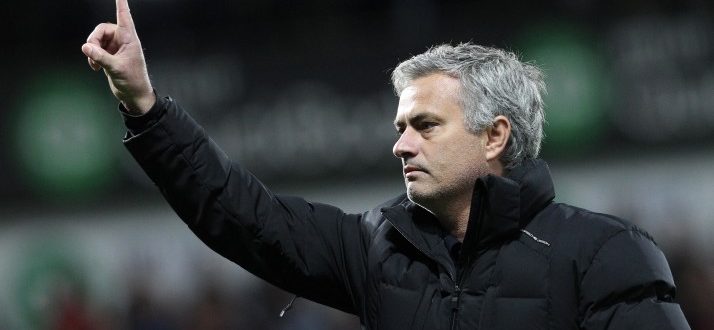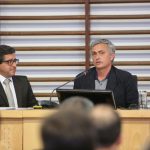Portugal’s army of ‘special ones’
It has more Champions League coaches than any other country.
LISBON — If you find José Mourinho hard to stomach, how about an army of “special ones?”
Since Mourinho’s run of success with the likes of Chelsea, FC Porto and Inter Milan, soccer coaches have become one of Portugal’s best exports.
China, Angola and the United Arab Emirates are among the most popular destinations, but not all are toiling away on soccer’s furthest frontiers.
For the second season running, Portugal has more coaches in Europe’s elite Champions League than any other nation.
There are 10 leading clubs into the 2015-16 competition, more than the combined total from Italy, Germany and England.
“Portuguese coaches have a vast tactical and strategic knowledge of the game — which makes them the best in the world,” says Jorge Jesus, who coached Lisbon’s Benfica to three Portuguese championships before switching in June to crosstown rivals Sporting.
Jesus can rival self-proclaimed “special one” Mourinho for modesty, but he may have a point — Portuguese coaches led teams to seven national championships on three continents last season.
…It’s an impressive record for a country of just 10 million whose national team has never won a major international trophy.
Besides Mourinho taking Chelsea to the top of the English Premiership and Jesus’ victory with Benfica, Portuguese-led clubs won the top leagues in Greece, Switzerland, Russia, Egypt and Mexico.
Toni Oliveira just missed out. Tractor Sazi FC — coached by the former Benfica midfielder — failed to capture Iran’s Persian Gulf Pro League by just one point.
Despite that lapse, it’s an impressive record for a country of just 10 million whose national team has never won a major international trophy.
So what’s the secret in this surge of soccer success?
Local experts point to a cocktail of deeply engrained soccer culture, the country’s long tradition of producing adaptable emigrants and some fiendishly clever training techniques developed at top clubs and universities.
“Almost all these guys grew up with the game, they played since they were kids, went to games since they were kids,” says Mariana Cabral, a sports journalist with the weekly newspaper Expresso and a qualified soccer coach. “It’s a passion for them. Portuguese coaches don’t do this just as a profession.”
It’s hard to overestimate the role soccer plays here. Three of Portugal’s six best-selling dailies are sports papers dominated by soccer. With 270,000 fans paying their dues, Benfica has more members than any other soccer club in the world, according to a Brazilian study published in April. FC Porto also makes it into the top 10 with 125,000.
“We are a small country, but a country that adores football,” Cabral told POLITICO. “It doesn’t matter if you’re a man or a woman, young or old, football is a constant presence, part of the culture.”
Portugal is also a country with 20 percent of its citizens living abroad. That history of emigration also helps explain the success of overseas coaches, says José Pereira, president of the National Football Coaches Association.
“Portuguese coaches are like the Portuguese in general, they have a knack of adapting to new circumstances,” Pereira said in an interview. “We’re a country that has produced many emigrants and generally they are accepted wherever they go. They fit in well, they easily adapt to their surroundings.”
A lack of opportunities at home also forces soccer coaches to look abroad.
Portugal’s Primeira Liga is dominated by Benfica, FC Porto and Sporting. Since the league was formed in 1934, clubs outside the big three have won just twice. There’s little prestige — or money — to be found in the lower echelons, so talented coaches are quick to seek their fortune elsewhere.
Besides big names like Mourinho, Paulo Sousa of Italy’s Fiorentina or Leonardo Jardim riding high in the French league, there are plenty of Portuguese working in more humble coaching positions from Korea to Kenya to Canada.
More than 30 are in China. Most are working with youngsters through the Winning League Football Academy set up by former world No. 1 player Luís Figo. It’s operating in eight cities helping Chinese ambitions to emerge as a major soccer power in the next generation.
Then there’s tactical periodization.
This theory of soccer training was developed in the 1990s by Vítor Frade, a sports lecturer at the University of Porto and coach at FC Porto. It’s been hugely influential in developing the techniques of Mourinho and other Portuguese coaches.
The idea is complex.
“A concept of training that seeks through respect for a conceptual matrix and its own methodological principles to construct a specific game. A construction which is a non-linear dynamic process,” says a presentation by former FC Porto youth coach José Guilherme Oliveira.
It sounds like gobbledygook, but it works.
“I always have something to learn” — José Mourinho.
Applying tactical periodization principles, Mourinho led FC Porto to victory in the Europa League in 2003 and captured the Champions League the following season, putting Europe’s strongest clubs in the shade.
He’s gone on to win three English Premierships with Chelsea; Spain’s La Liga with Real Madrid; plus another Champions League and two Italian Serie A championships with Inter Milan.
Put simply, tactical periodization aims to focus players on the tactics of the whole team through all phases of the game from defense to attack. Rather than work in isolation on building physical endurance or ball skills, every element of training is bought together in a holistic view of the team’s overall game plan.
Combining a deep-rooted passion for the game with the innovative soccer theories coming out of the universities in Lisbon and Porto has honed Portugal’s coaching edge.
Mourinho’s success, and that of younger coaches like André Villas-Boas at Zenit St. Petersburg or Nuno Espírito Santo of Valencia, has further boosted demand for the Portuguese coaching brand.
Others are now hoping to get in on the act.
Demand to discover Portugal’s coaching secrets has led the University of Lisbon to launch an English-language masters in “high performance football coaching.”Mourinho has helped design the curriculum.
“It’s fundamental to pass on knowledge, but also to help the students to analyze and think and disagree,” Mourinho said during a presentation of the course in June. “If I had time, I’d also sign up for the lessons. I always have something to learn,” he added modestly.
Source: Politico


